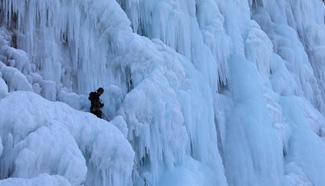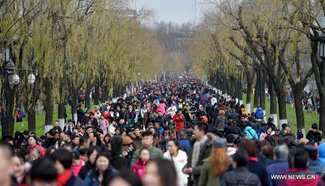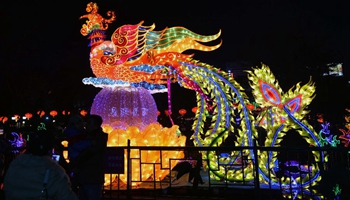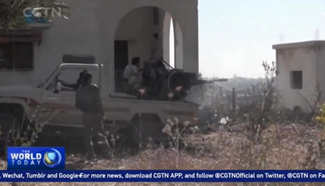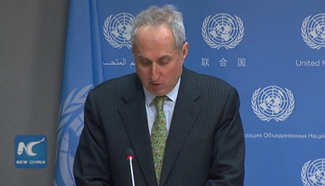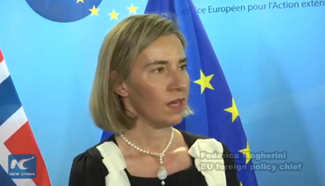by Keren Setton
JERUSALEM, Jan. 31 (Xinhua) -- Days after U.S. President Donald Trump was inaugurated, the Israeli government announced its plans to build an additional 2,500 homes for Jewish settlers in the West Bank.
In the past, such an announcement immediately resulted in an American condemnation. This time it was smooth sailing for the Israeli government.
It was a farewell message from Israeli Prime Minister Benjamin Netanyahu to former U.S. President Barack Obama. The two often clashed on the issue which put a strain on their relationship.
At the time of the announcement, Israeli Defense Minister Avigdor Lieberman said Israel "was resuming normal life in Judea and Samaria (the bibilical name of the West Bank)."
The right wing government in Israel felt restricted during the years of the Obama administration. Although settlement building continued, it was not at a satisfactory pace for Netanyahu and his allies.
Israel's construction plans did lead to a Palestinian outcry. Their fear, together with the majority of the international community, is that the more Israel tighten's its grip on the West Bank, the hopes for them achieving a state become dimmer. Palestinians see the West Bank as a critical part of their future state.
Israeli settlements in the West Bank have been a contentious topic since Israeli forces captured the West Bank during the 1967 Mideast War.
Once under its rule, Israel immediately started settling the area with Jewish citizens. However, it never officially annexed the land, aside from East Jerusalem.
In the West Bank, which Israelis often refer to by its biblical name Judea and Samaria, there are approximately 385,000 Jewish settlers, nearly tripple the figure for 1993 when the Oslo Accords were signed.
Palestinians see the territories as part of their future state and the settlements which have been expanding annually since 1967 are a major stumbling block for them.
The international community is at odds with Israel on the issue, leaving the country largely isolated in the international arena.
Only recently did the United Nations Security Council (UNSC) passed a resolution condemning Israel, saying settlements are illegal.
Anat Ben Nun is the Director of Development and External Relations at Peace Now which is an Israeli organization aimed at promoting a two-state solution between Israelis and Palestinians and functions as a settlement watch-dog, monitoring their evolution on the ground.
She explains the legal standing of the territories, as many in the international community see it.
"According to the Geneva conventions and the Hague regulations, an occupying power cannot transfer its own population to the occupied territory and this is exactly what Israel has been doing since 1967. Israel did not really decide on what to do with these territories. On the one hand it did not annex them and give citizenship to everyone who lives in these areas. On the other hand, it sent its own population to go and live in these areas," Ben Nun explains.
Israel claims it has a biblical right to the land but also a security need. Israeli presence in the West Bank is believed by many in the country to safeguard it from Palestinian attempts to attack it.
However, the ambiguity with which it treats the territories, as Ben Nun describes, indicates that successive Israeli governments are aware of the problematic nature of the settlements.
She does not deny the Jewish biblical connection to the land.
"Jews have a vast history in this place and this cannot be denied. It doesn't mean that we need sovereignty over the entire land in order to have a religious connection to it," she believes.
Still, there are different interpretations of international law.
Israel captured the territory from Jordan during the 1967 Mideast War. Since Jordan has said it has no claim over the land, Israel says its future needs to be decided by both Israelis and Palestinians through negotiation.
But for Moshe Saville, a deputy mayor of Gush Etzion, one of Israel's large settlement blocs in the West Bank, Jewish history is the main reason for the country's need to be the sovereign power there.
"We lived here for thousands of years in this land. We have all the proof that this land belongs to us," Saville says.
"It's absolutely legal. There's not a question about it. There is no question that we must stay here," he adds with conviction.
Throughout the years, the Israeli governments of all political affiliations have supported settlements and helped them grow.
In fact, left-wing governments with members who support the two-state solution were instrumental in the fortification of Israel's presence in the West Bank.
But for the last eight years, Israeli Prime Minister Benjamin Netanyahu and his substantial support for the settlements can be felt on the ground.
It led to a highly tense relationship with former U.S. President Barack Obama.
Despite a short recess in which he committed Israel to a 10-month moratorium on settlement construction in order to try and revive stalled peace talks with the Palestinians, Netanyahu strengthened Israel's hold on the West Bank.
Peace Now says there never really was a freeze on settlements.
"When you look at construction on the ground, in the time of a so-called freeze, you see that construction is still ongoing. Construction is now happening in the most sensitive areas which is either those areas in the blocs that will never be a part of Israel or deep in the West Bank," says Anat Ben Nun.
The Israeli presence in the West Bank is visible to anyone. A view from the elevated settlement of Neve Daniel in the outskirts of Jerusalem displays small dots of Palestinian presence amidst thousands and thousands of Israeli housing units.
The congruence of the Netanyahu and Obama administrations were testing times for the former's settlement policy. Even though Peace Now reported a continuation of settlement expansion, for the settlers this was not enough.
"Even in those days, we could (have) built thousands of houses in Gush Etzion and we just built in the last few years 600 houses... so it isn't like we built whatever we want, wherever we want. But I hope this situation is going to change and we are going to build more," says Moshe Saville of Gush Etzion.
He was speaking days after the inauguration of U.S. President Donald Trump who many think will be more accommodating to Israel's settlement policies.
American flags were put up next to Israeli flags at the main intersection in Gush Etzion, a symbol of local Jewish anticipation of the Trump era.
The Gush Etzion intersection has been the target of many violent attacks by Palestinians in recent months. As Palestinian taxis mingle with Israeli cars, the area is tense and peaceful at the same time. It is representative of many areas in the West Bank.
The attacks are part of a low-intensity conflict that has been brewing over the past year.
A renewed wave of violence has seen Palestinians targeting mainly soldiers and settlers, seeing them as legitimate targets in the struggle for statehood.
Since September 2015, approximately 200 Palestinians have been killed. Tens of Israelis have also been killed.
Israel says most of the Palestinian victims were assailants who were killed while attacking or attempting to attack Israelis. Some of them were killed in clashes with Israeli forces.
This comes after years of consecutive Netanyahu governments fostering the settlements. Tensions on the ground are at a constant boiling point.
"Throughout the Netanyahu period, we've seen a few different trends on the ground. One was the expansion of the settler population, especially in the most sensitive areas. Areas that are being or will be negotiated over. We have seen the expansion of construction of a lot of bypass roads, a lot of infrastructure that later leads to the expansion of the settler population. We also saw a phenomena of legalization of illegal outposts. So those outposts that even the Israeli government considered as illegal before are now slowly being turned into official settlements."
Indeed, a quick tour of the territories will convey not only a construction boom in housing but also in infrastructure.
After the Israeli-Palestinian interim agreement of 1993, Israel continued to create new settlements, only now they were not officially recognized by Israeli law. They are called outposts and many of them are in isolated areas. Some are not, they are just extensions to existing settlements.
Palestinians call this land grab, creating facts on the ground that serve as an obstacle to statehood.
Often these outposts are a collection of run-down caravans in which families live in cramped quarters in the name of ideology.
In recent months, the Israeli government is promoting a law that will retroactively legalize these outposts.
This has attracted international and internal Israeli criticism.
It is clear that the feasibility of a Palestinian state decreases as the Israeli presence in the West Bank grows. Saville, however, dismisses the notion of a state for the Palestinians.
"I don't think the Palestinians need a state. We see Palestinians as residents and not as part of a Palestinian state. It's a bad solution to give (them) a state, it is going to bring terror immediately," he explains.
He may see Palestinians as residents of Israel, but they are not equal under Israeli law. Saville insists peaceful coexistence under the same flag is possible saying peace will come from "down upwards."
"If we'll build more and more and more, I believe, (it will) create a real peace between us and the Palestinians," Saville explains.
Israelis and Palestinians may lead their daily lives along in the West Bank. They travel on the same roads and often shop at the same markets. But they also live separated from each other with huge differences in their quality of life. Palestinian movement is severely restricted not only by the presence of the Israeli military that covers the area with checkpoints but also by settlements scattered throughout, sabotaging any possibility of territorial continuity for the Palestinians.
For Anat Ben Nun at Peace Now, a future settlement does not include any Israeli presence in the West Bank.
"Settlements as they are today are not just peaceful towns in the midst of Palestinian population. These are ideological, political statements claiming sovereignty, trying to prevent the possibility of a Palestinian state and therefore I think an evacuation of settlements in this point in time is a critical part of a solution," she says.
In a poll conducted a few months ago, a small majority of Israelis and Palestinians remained in favor of a two-state solution to the decades-old conflict. These numbers were higher in previous years.
Saville expresses a growing sentiment amongst many Israelis that the solution is a dying prospect.
"I don't think this is the solution," he says.
On the ground, Israel is tightening its grip on the land and Palestinians are fighting an uphill battle against it.



